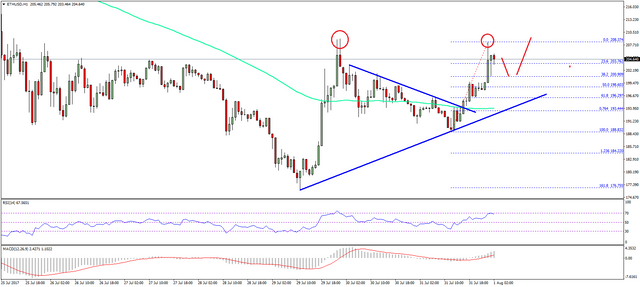
Even though we’ve highlighted some of the criticisms directed toward Ethereum before, they are not the only issues the network has to address. It is disappointing to see such a prominent ecosystem hindered by technical issues, ideological decisions which can easily backfire, and other factors which may eventually spell disaster for Ethereum. Below are some of the downsides of which Ethereum users and investors alike should be aware.
Cryptocurrency ICOs are a Risk
Even though virtually every company or project looking to raise money wishes to conduct an Ethereum-based ICO, these crowdsales can have negative repercussions. A lot of these projects will eventually liquidate the amount of ETH raised and dump it all on the market. Not only will this affect the Ether price negatively, but it also shows Ethereum is merely a facilitator to raise funds, rather than technology in which these companies believe. It is only a matter of time until the influx of cryptocurrency ICOs backfires on the Ethereum ecosystem. There is no guarantee that any of these projects have legitimate intentions, and any bad PR will automatically taint Ethereum’s reputation further. While it is true that Ether allows people from all over the world to invest in ICOs, there is never a guarantee for success.
Exploits and Weaknesses
Even though many companies have joined the Ethereum Enterprise Alliance, they are not necessarily aware of the issues this network has. We have seen two major exploits discovered and used, both of which resulted in massive amounts of funds being stolen. The first exploit was the DAO smart contract bug, and the second exploit showed how Ethereum has no secure multisignature wallet solution currently. Immature technology often suffers from issues like these.
No Supply Cap
Contrary to what some people may assume, there is no official hard cap on the amount of ETH. While proof-of-work will be replaced by proof-of-stake in the future, Ethereum will continue to be inflationary as a result. Unlike Bitcoin, with its 21 million hard cap, Ethereum has no fixed maximum supply. This means the value of every individual ETH lowers every time a new coin is brought into circulation. In this regard, Ethereum is quite similar to fiat currencies, even though its level of inflation is significantly lower.

Not an Immutable Blockchain
The main selling point of Ethereum is how it provides blockchain technology and new features to the entire world. One of the primary aspects of using a blockchain is that this ledger creates an undisputed record of events which can no longer be altered once the information has been accepted and confirmed by the rest of the network. That is no longer the case for Ethereum, and it is surprising how few people recognize this important detail. Ethereum’s developers introduced a hard fork after the DAO was hacked. This hack put a large amount of the available ETH supply at risk of falling into the wrong hands. The hard fork also removed the immutability aspect of the Ethereum blockchain. This means that any application or project built on top of the Ethereum blockchain could see part of its history or transactions wiped out if a similar incident were to occur. People looking for the immutable Ethereum blockchain should look into Ethereum Classic, which was maintained as an ideological opposition to this blockchain rollback.
To speak to immutablity: helping stop theft as the only example of a "rollback" is not necessarily a bad thing. We are not talking chargebacks here. We are talking 100% agreed consensus that a contract was used not according to intention. That said, the recent misuse of poorly written contracts as in parity - did NOT cause a hard fork. Therefore, one can assume that the new ETH immutability is pretty strong. To speak to #3 "Eth has no secure mutilsig wallet" That is a RIDICULOUS statement. What happened with Parity was simply because the PARITY wallet designer did not add an "internal" flag to the initwallet function (or otherwise protect the function to ensure it was not already initialized to "fresh"/"new" addresses). All the "heat" should be on him, not on the ETH chain. That is now fixed incidnently. Go to GITHUB to review the edits.And to speak to market cap limit: The level of new coins can be compared to any new coin including bitcoin when it was only two or three years old as well. that is because one can look at it like this, before reaching any market cap, x% of coins are produced per year. Now while btc was producing 14% new coins a couple years ago, it was still skyrocketing. Ethereum will be produc9ing only 1% new coins per year or less, once Proof of Staek is implemented, sometime in November. Far less than what bitcoin is currently at, Somewhere around 4.5% I believe, recently cut from 9%? (Math for btc: 12.5 btc per mine * 52,000 mines per year) = 657,000 coins / 16 million total coins = 4% rate right now.) ETh is at 14% right where BTC was just two short years ago. Eth will be at 1% in November. As an author, it is hard to know all the facts in such a hard space. Btu I hope I've shed some light on some of them. The larger point here s that an even MORE senseless irresponsible contract was just exploited with Parity - but there is no roll back is there? No Ethereum 3 is there? The point is I think Ethereum developers are slightly more hardened now ... Now to your point on history. I did not mean they agreed to the fork. I means they agreed that the contract was used in a way that was not intended. Even if 100% voted agsint a fork, bet yoiu cant find me one person in the DAO inclusive of hte devloper of hte contract but exclusive of the thief who intended the use of the contract that way. The point is not to rehash agreement to fork or not - the point is that a strong argument is that NOBODY intended its use in that way. One mihgt also ask, how many people "lost" because of the rollback on valid transactions happening around that same time. How much was lost? I dont agree or disagree with the fork. I just state an obvious fact about now - Ethereum appears HARDER, more IMMUTABLE now than before. NOTHING is immutable because ANYONE can start a hard fork which always takes at least "some mining power away, and if its "enough" ir can take the symbol too. Either way, any software "update" soft or hard, if it has ANY potential to take the "symbol" eth or btc with it - then it is NOT immutable. So, therefore, NOTHING is immutable - except God, death and taxes. as these ICOs don't take just ETH, and often also take Bitcoin as funds. Ethereum is used as the platform to record the tokens, the fact that ETH is also used for funds is secondary. Also, many of these ICOs also lock in a % of funds in crypto form. Which means, that even if price goes up with people buying ETH to participate in ICOs, the ICOs then proceed to sell just a part of those assets (admitedly, often > 80%), but they normally retain a portion in ETH as well. Ultimately, the net trend is still in favour of the price going up. Not that the price is the only reflection of the technology's worth, mind you.Point 3 is not an issue with Ethereum, its ecosystem is still evolving. Bitcoin took a lot longer to get multisig widely in yse. Even if it was true that Ethereum lacks a multisig wallet, that is unlikely to be the case for long, and hardly a reason for its ultimate demise.Point 2 is equating token price with the success of the technology. Rivers have been written about this, and small inflation is not a problem, it reduces the scarcity of the underlying asset, and makes it more useful.Point 1 ignores the fact that no blockchains are really immutable, they merely aim to be. I suggest you search "immutability myth" and read an article by Gidean Greenspan - it's worth it. Ethereum only forked because its community allowed it to - at that stage - and there's no indication that it would happen now, or in the future. In fact, as the community grows, it's increasingly less likely for that to happen. You could also claim Bitcoin has forked hundreds of times for every copycat that's been launched, plus the recent debacles.There are valid points to make about Ethereum and blockchains as a whole, but in my opinion, the above points will hardly cause the demise of Ethereum. Now, if you'd like to talk about blockchain bloat due to smart-contracts...
IMMUTABILITY:
Let's explore this concept as it pertains to investors. While all chains are immutable in that a hard fork is really a different chain, it is always the new "winning" chain (highest block height) that maintains the same symbol, so therefore, the same-symbol-different-chain progression over time speaks to the attitude of the developers as it might pertain to new changes going forward after the split. With ETH - the attitude going forward is "we won't tolerate contract exploits" however, we see that ETH now is a LOT more resistive to mutabiloity now - look at the Parity hack, look at so many other hacks - were there any rollbacks? any split? no.
Content credit:
https://themerkle.com/top-4-reasons-why-ethereum-may-ultimately-fail/
hard to fail now... it is added everywhere...
Downvoting a post can decrease pending rewards and make it less visible. Common reasons:
Submit
its about uncertainity..
Downvoting a post can decrease pending rewards and make it less visible. Common reasons:
Submit